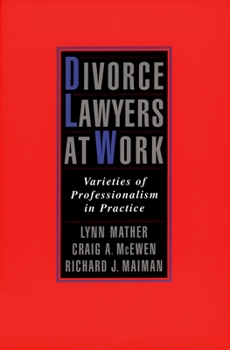Divorce Lawyers at Work: Varieties of Professionalism in Practice
Select Format
Select Condition 
Book Overview
How do lawyers think about and make the important decisions that constitute the day-to-day practice of law? This book explores that question through an extensive empirical study of lawyers practicing divorce law in New England. The authors emphasize the importance of "collegial control" in shaping lawyers' decisions and identify a variety of "communities of practice" that serve as key agents of that control.
Offering a new understanding of the...
Format:Paperback
Language:English
ISBN:019514516X
ISBN13:9780195145168
Release Date:September 2001
Publisher:Oxford University Press
Length:256 Pages
Weight:0.85 lbs.
Dimensions:0.7" x 6.0" x 9.1"
Customer Reviews
0 rating





